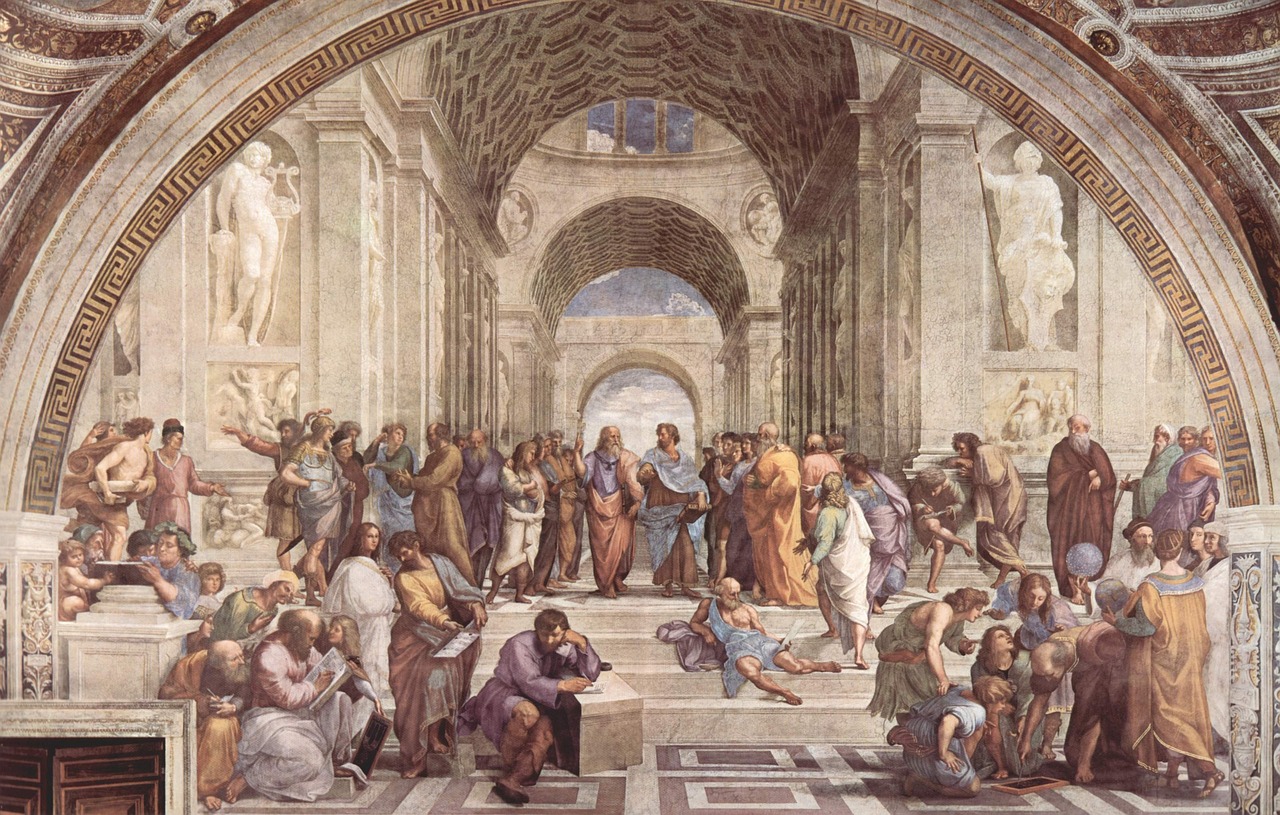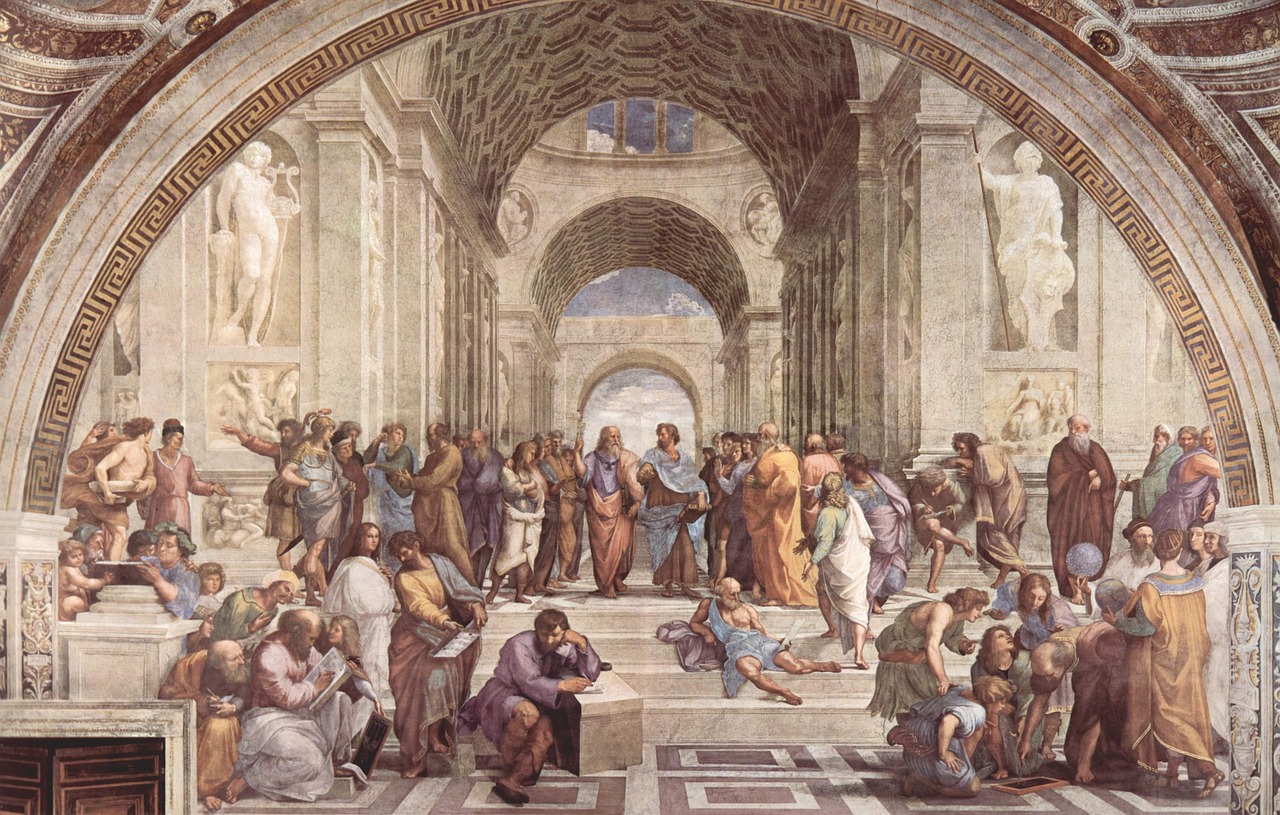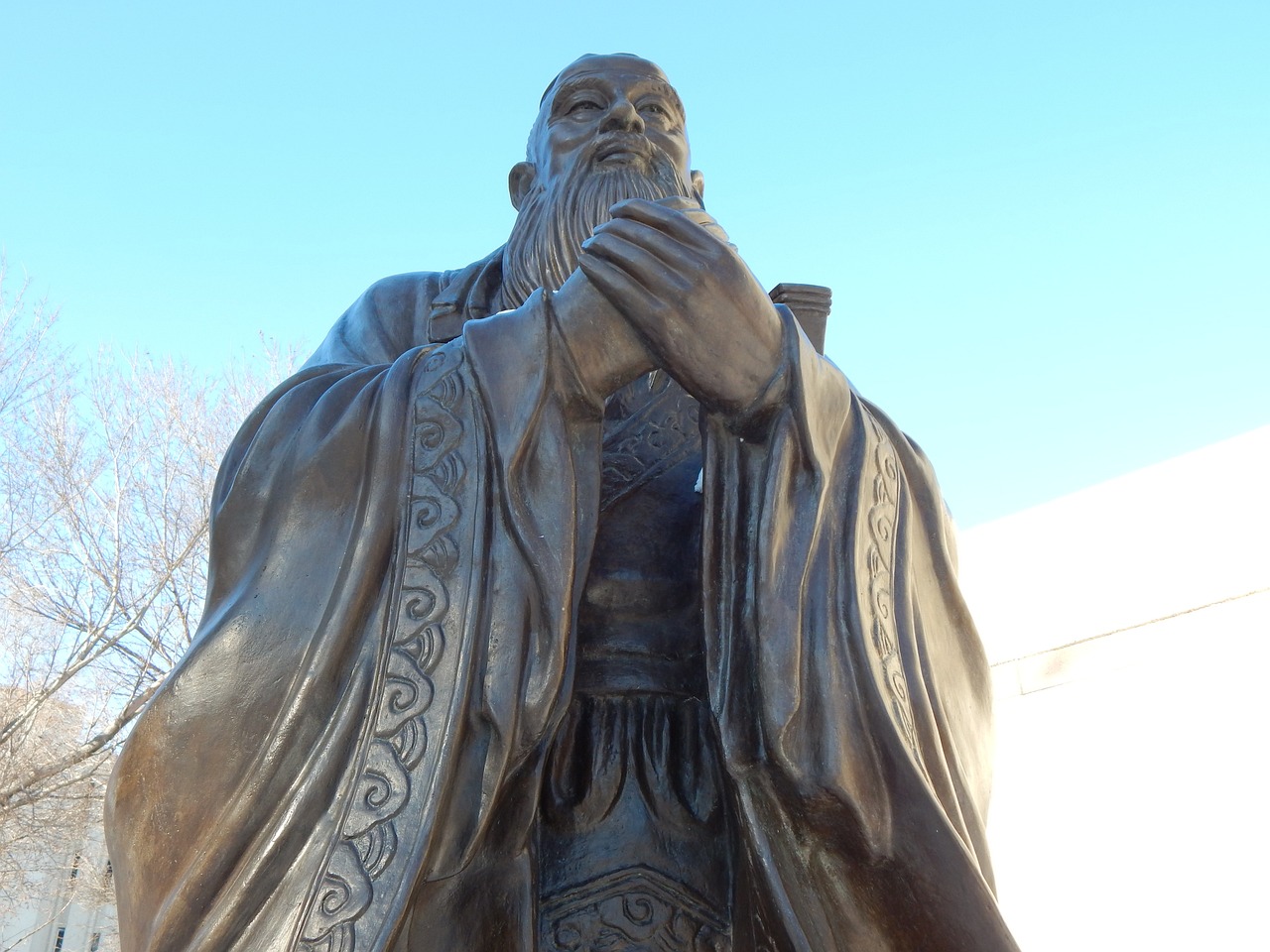Ontology - Explained Through the Lens of Philosophy
Ontology is a fascinating branch of philosophy that dives deep into the questions surrounding the nature of being, existence, and reality. Imagine standing at the edge of a vast ocean of thought, where every wave represents a different aspect of what it means to exist. In this article, we will explore the significance of ontology, the key theories that have emerged over centuries, and how this philosophical inquiry impacts various fields of study today. So, grab your philosophical surfboard as we ride the waves of understanding!
At its core, ontology is the study of what exists. It seeks to answer fundamental questions such as: What does it mean to be? What kinds of things exist? And how do these entities relate to one another? By examining the categories of being and their relations, ontology provides a foundational framework for understanding various philosophical inquiries. Think of it as the skeleton of philosophy, giving structure to the fleshy debates and discussions that follow.
The evolution of ontology is a tale woven through the thoughts of significant figures in philosophy. From Aristotle to Descartes, and even Kant, each philosopher has contributed unique perspectives that have shaped the discipline. Their ideas not only influenced ontology but also reverberated through the corridors of subsequent philosophical thought. Understanding these historical developments is like tracing the roots of a mighty tree, where each branch represents a different philosophical inquiry.
When we talk about ontology, we cannot overlook Aristotle. His contributions are like the bedrock upon which much of modern philosophical thought stands. Aristotle introduced the concepts of substance and essence, which laid the groundwork for metaphysical discussions. His categorization of beings continues to influence contemporary philosophical discourse, making it essential for anyone interested in understanding the complexities of existence.
One of the key distinctions in Aristotle's ontology is between substance and accident. Substance refers to what something fundamentally is—its essence—while accidents are properties that can change without altering that essence. For example, consider a tree: its substance is what makes it a tree, whereas its height or color are accidents that can vary. Understanding this distinction is crucial for grasping the nuances of Aristotle's thoughts.
Aristotle's categories classify different types of entities, including substance, quantity, and quality. This classification helps in analyzing and understanding the complexities of existence and reality. It’s akin to organizing a messy closet into neat sections, making it easier to find what you need. Here’s a brief overview of some of Aristotle’s categories:
| Category | Description |
|---|---|
| Substance | The fundamental entity that exists independently. |
| Quantity | The measure of how much of something exists. |
| Quality | The characteristics that describe an entity. |
Fast forward to today, and we see that contemporary ontology has expanded to include various theories such as existentialism and realism. These theories address the nature of existence in light of modern scientific and philosophical advancements. Just as a tree grows and branches out, modern ontology has evolved to incorporate new ideas and perspectives that challenge traditional notions of being.
Throughout history, philosophers like Anselm and Descartes have proposed ontological arguments to demonstrate the existence of God. These arguments leverage the concept of being to assert that a perfect being must exist. It's like trying to prove that the sun must rise because we can conceive of light. These arguments have sparked intense debates, making ontology a hotbed for philosophical discourse.
Anselm's argument posits that God, defined as the greatest conceivable being, must exist in reality because existing in reality is greater than existing solely in the mind. This assertion challenges us to think about the nature of perfection and existence. If we can conceive of the greatest being, shouldn’t it exist? It’s a thought-provoking question that continues to resonate in philosophical discussions.
However, ontological arguments have faced significant criticism from philosophers like Kant and Hume, who challenge the assumptions about existence and the nature of perfection. Their critiques spark ongoing debates that keep the philosophical fires burning. It’s like a never-ending game of intellectual chess, where each move leads to new questions and insights.
Today, ontology intersects with various disciplines, including science, linguistics, and artificial intelligence. Understanding these connections enhances our comprehension of existence and reality in a modern context. It’s like connecting the dots in a complex picture, revealing a clearer understanding of how different fields influence our perception of reality.
The relationship between ontology and science explores how scientific theories shape our understanding of existence. This interplay raises profound questions about the nature of reality as perceived through empirical evidence. It’s a dynamic dance between philosophy and science, where each step influences the other.
In the realm of AI, ontology refers to structured frameworks that define concepts and relationships within a domain. This application highlights the significance of ontology in organizing knowledge and facilitating machine understanding. It’s akin to teaching a child how to categorize their toys, allowing them to make sense of their world.
- What is the main focus of ontology? Ontology primarily focuses on the nature of being and existence.
- How did Aristotle influence ontology? Aristotle introduced key concepts such as substance and essence, which are foundational to ontological discussions.
- What are some modern ontological theories? Contemporary theories include existentialism and realism, which expand on traditional notions of existence.
- How does ontology relate to science? Ontology examines how scientific theories shape our understanding of reality and existence.

What is Ontology?
Ontology is a fascinating branch of philosophy that dives deep into the essence of being, existence, and reality. Imagine standing at the edge of a vast ocean, each wave representing a different aspect of existence—ontology is the study that helps us navigate these waters. It seeks to answer profound questions such as: What does it mean to exist? What categories can we use to classify different entities? By examining the fundamental nature of reality, ontology provides a foundational framework that underpins various philosophical inquiries.
At its core, ontology investigates the categories of being and their interrelations. Think of it as a sophisticated map that helps us chart the territory of existence. This map is not just theoretical; it has practical implications across numerous fields, including science, linguistics, and even artificial intelligence. For instance, in computer science, ontologies help in organizing information, allowing machines to understand and process data more effectively.
To further illustrate the significance of ontology, consider the following key areas it influences:
- Philosophy: It forms the basis for metaphysical discussions.
- Science: Helps in understanding the nature of reality through empirical evidence.
- Artificial Intelligence: Aids in structuring knowledge for better machine comprehension.
In essence, ontology is not merely an abstract concept; it is a vital tool that helps us make sense of our world. Whether you're pondering the existence of a chair or contemplating the universe, ontology provides the lens through which we can explore these questions. As we delve deeper into this subject, we will uncover how historical figures like Aristotle and modern thinkers have shaped our understanding of being and existence.

Historical Development of Ontology
The historical development of ontology is a fascinating journey that traces back to ancient philosophical thought. It is a tale woven through the minds of some of the greatest thinkers who have ever lived. From Aristotle to modern philosophers, ontology has evolved, adapting to the changing landscapes of thought and culture. Each philosopher brought unique insights that shaped the very fabric of ontology, influencing not just philosophy but also science, religion, and even art.
One of the earliest and most significant contributors to ontology was Aristotle. His work laid the groundwork for understanding the nature of being. Aristotle's ontology is characterized by his exploration of substance and essence, which are pivotal concepts in distinguishing what things are fundamentally. He categorized beings into various types, which helped clarify the complexities of existence. For Aristotle, understanding the essence of a thing was crucial, as it defined its very being.
The evolution of ontology continued with philosophers like René Descartes in the 17th century. Descartes introduced a dualistic approach that separated the mind from the body, raising questions about the nature of existence itself. His famous declaration, "Cogito, ergo sum" (I think, therefore I am), emphasized the role of consciousness in defining reality. This marked a significant shift in ontological discussions, steering them towards the subjective experience of existence.
As we moved into the 18th century, Immanuel Kant further complicated the landscape of ontology. Kant challenged the traditional notions of being by introducing the idea that our understanding of existence is shaped by our perceptions and experiences. He proposed that while we can know phenomena (the things as they appear), the noumena (the things in themselves) remain unknowable. This distinction opened up a new dimension in ontological inquiry, emphasizing the limits of human understanding.
Throughout the 19th and 20th centuries, ontology continued to evolve, with movements like existentialism and realism challenging previous frameworks. Existentialists, such as Jean-Paul Sartre, focused on individual existence and the absurdity of life, while realists sought to understand the world as it is, independent of human perception. This interplay between different ontological perspectives enriched philosophical discourse and led to new ways of understanding existence.
In addition to these key figures, various schools of thought emerged, each contributing to the rich tapestry of ontology. The following table summarizes some of the pivotal philosophers and their contributions to ontological thought:
| Philosopher | Key Contribution |
|---|---|
| Aristotle | Introduced substance and essence; categorized beings. |
| René Descartes | Proposed dualism; emphasized consciousness in existence. |
| Immanuel Kant | Distinguished between phenomena and noumena; challenged traditional notions of being. |
| Jean-Paul Sartre | Focused on individual existence and the absurdity of life. |
As we reflect on the historical development of ontology, it becomes clear that this branch of philosophy is not just an abstract field of study; it is a living dialogue that continues to shape our understanding of existence in profound ways. Whether through the lens of ancient thinkers or modern theorists, ontology invites us to ponder the very nature of reality, challenging us to question what it means to be.
- What is ontology? Ontology is the branch of philosophy that studies the nature of being, existence, and reality.
- Who are some key figures in the history of ontology? Key figures include Aristotle, Descartes, and Kant, each contributing unique perspectives.
- How does ontology relate to other fields? Ontology intersects with various disciplines, including science, linguistics, and artificial intelligence, enhancing our understanding of existence.

Aristotle's Contribution
Aristotle, often hailed as the father of Western philosophy, made profound contributions to the field of ontology that continue to resonate through the ages. His approach to understanding the nature of being and existence was groundbreaking, as he sought to categorize and clarify the complexities of the world around us. One of his most significant contributions was the introduction of the concepts of substance and essence. For Aristotle, substance is what something fundamentally is—its core identity—while essence refers to the properties that define that identity. This distinction laid the groundwork for countless metaphysical discussions that followed.
In Aristotle's ontology, the notion of substance is pivotal. He argued that substances are the primary entities in the universe, and everything else—qualities, quantities, and relations—are secondary. To illustrate this, think of a tree: its substance is the tree itself, while its height, color, and location are merely accidents that can change without altering its essence. This idea of substance versus accident is crucial for grasping how Aristotle viewed the world, and it serves as a foundation for many modern philosophical inquiries.
Aristotle also developed a systematic framework known as the Categories, which classifies different types of beings into distinct groups. This classification system includes ten categories: substance, quantity, quality, relation, place, time, position, state, action, and passion. Each category helps philosophers and scholars analyze the complexities of existence and reality, allowing for a more structured approach to ontological questions. Here’s a quick look at these categories:
| Category | Description |
|---|---|
| Substance | The essence of a thing, what it fundamentally is. |
| Quantity | The amount or number of a substance. |
| Quality | The characteristics or properties of a substance. |
| Relation | The way substances relate to one another. |
| Place | The location of a substance. |
| Time | The temporal aspect of a substance. |
| Position | The arrangement of a substance. |
| State | The condition of a substance. |
| Action | The activities performed by a substance. |
| Passion | The experiences undergone by a substance. |
This structured approach not only aids in philosophical discourse but also enriches our understanding of the world. Aristotle's contributions to ontology are not just historical footnotes; they are the bedrock upon which much of Western thought is built. His ideas invite us to ponder deeper questions about our existence and the nature of reality, encouraging a continuous exploration of what it means to be.
- What is ontology? Ontology is the branch of philosophy that studies the nature of being, existence, and reality.
- Who is Aristotle? Aristotle is a Greek philosopher whose work laid the foundation for many areas of philosophy, including ontology.
- What are the categories of being according to Aristotle? Aristotle categorized beings into ten categories, including substance, quantity, and quality.
- Why is Aristotle's ontology important? Aristotle's ontology provides a systematic framework for understanding the complexities of existence and has influenced countless philosophical discussions.

Substance vs. Accident
When we dive into the depths of Aristotle's ontology, we encounter a fundamental distinction that is crucial for grasping the essence of existence: the difference between substance and accident. Imagine you have a beautiful painting hanging on your wall. The canvas and the paint represent the substance of the artwork—its fundamental components. Now, think about the lighting in the room, the frame around it, or the dust that might settle on it. These are the accidents; they can change without altering the painting's core identity. In simpler terms, substance is what something is at its core, while accidents are the attributes that can vary without affecting that core identity.
To illustrate this further, consider the following table:
| Aspect | Substance | Accident |
|---|---|---|
| Definition | The essential nature of a thing | Properties that can change |
| Example | A tree (its trunk and roots) | Color of the leaves, presence of fruit |
| Stability | Generally unchanging | Subject to change |
This distinction is not just a philosophical exercise; it has real-world implications. For instance, in the realm of identity, understanding what constitutes the essence of a person versus the traits that can change—like hairstyle or clothing—can lead to profound insights about self and existence. When we ponder questions like, "What makes me, me?" we are, in essence, wrestling with the concepts of substance and accident.
Furthermore, this dichotomy plays a significant role in various fields, including metaphysics, ethics, and even science. In metaphysics, for instance, distinguishing between what is essential and what is incidental can help clarify debates about existence and reality. In ethics, understanding the substance of moral actions versus their contextual accidents can influence our judgments and decisions.
In summary, grasping the difference between substance and accident is not merely an academic endeavor; it is a key to unlocking deeper philosophical questions about existence. It challenges us to consider what is truly essential in our lives and what can change without altering our core selves. This exploration invites us to reflect on our identities, relationships, and the world around us, making it an essential topic in the study of ontology.
- What is the difference between substance and accident?
Substance refers to the essential nature of a thing, while accidents are the properties that can change without altering that essence.
- Why is this distinction important?
This distinction helps clarify debates in philosophy, ethics, and science by allowing us to differentiate between what is fundamental and what is variable.
- Can you give an example of substance and accident in everyday life?
Sure! For a person, their DNA and core personality traits are substances, while their hairstyle, clothing, and opinions can be considered accidents.

Categories of Being
Aristotle's exploration of ontology introduced a systematic way of categorizing different types of beings, which is crucial for understanding the complexities of existence. He proposed several categories that help us navigate the intricate web of reality. These categories serve as a lens through which we can analyze and discuss the various entities that populate our world, from the tangible to the abstract.
At the core of Aristotle's categories is the distinction between substance and accident. Substance refers to what something fundamentally is—its essence—while accidents are the properties that can change without altering that essence. For instance, consider a tree: its substance is what defines it as a tree, while its color or height can change without transforming its essential nature.
Aristotle identified ten primary categories of being, which can be grouped into two main types: substances and accidents. The categories include:
- Substance: The essential nature of an entity.
- Quantity: How much of something exists (e.g., five apples).
- Quality: The characteristics or attributes of a substance (e.g., red, sweet).
- Relation: How one entity relates to another (e.g., parent, sibling).
- Place: The location of an entity (e.g., in the room).
- Time: When an entity exists (e.g., yesterday, tomorrow).
- Position: The arrangement of an entity (e.g., sitting, standing).
- State: The condition of an entity (e.g., clothed, armed).
- Action: What an entity does (e.g., running, jumping).
- Passion: What is done to an entity (e.g., being hit, being loved).
These categories not only help in philosophical discussions but also have practical implications in various fields. For example, in science, categorizing entities helps in classifying species, while in linguistics, it aids in understanding sentence structure. By dissecting the different categories of being, we can better appreciate the nuances of existence and how they influence our perception of reality.
What is the significance of Aristotle's categories of being?
Aristotle's categories provide a foundational framework for understanding the nature of existence. They help us categorize and analyze different entities, facilitating deeper philosophical discussions and practical applications in various fields.
How do substance and accident differ?
Substance refers to the essence of an entity, while accidents are the properties that can change without altering that essence. For example, a car's color (an accident) can change, but it remains a car (its substance).
Can the categories of being be applied in modern contexts?
Absolutely! The categories of being are still relevant in contemporary discussions across various disciplines, including science, linguistics, and artificial intelligence, where they help in organizing knowledge and understanding relationships between concepts.

Modern Ontological Theories
In the realm of contemporary philosophy, ontology has evolved significantly, branching out into various theories that seek to address the complexities of existence in our modern world. One of the most prominent movements is existentialism, which emphasizes individual existence, freedom, and choice. Existentialists argue that existence precedes essence, meaning that a person’s identity and values are not predetermined but are shaped through their experiences and decisions. This perspective challenges traditional ontological views by placing the individual at the center of philosophical inquiry.
Another significant modern ontological theory is realism. Realists assert that the world exists independently of our perceptions or beliefs. They argue that objects have properties and exist whether or not we are aware of them. This notion is crucial in scientific discourse, as it underpins the idea that empirical evidence can lead us to truths about the universe. Realism stands in contrast to idealism, which posits that reality is mentally constructed or immaterial. These opposing views fuel ongoing debates in philosophy, especially regarding the nature of reality and how we can truly know it.
Furthermore, the advent of technology and the rise of digital ontology have introduced new dimensions to the discussion. In our increasingly digital world, the way we understand existence is being reshaped by virtual realities and artificial constructs. This has led to questions about the nature of being in a world where digital representations can mimic or even replace physical entities. For instance, how do we define the existence of an avatar in a virtual space? What does it mean for something to exist if it can be created and destroyed at will in a digital environment? These inquiries are pushing the boundaries of traditional ontology and inviting fresh perspectives.
In summary, modern ontological theories are not just academic exercises; they reflect our evolving understanding of existence in a complex world. From existentialism's focus on individual freedom to realism's commitment to objective reality, and the challenges posed by digital ontology, these theories invite us to reconsider what it means to be. As we navigate through these philosophical landscapes, we are constantly reminded that ontology is not merely a study of being but a profound exploration of our place in the universe.
- What is ontology? - Ontology is a branch of philosophy that studies the nature of being, existence, and reality.
- Who are some key figures in the history of ontology? - Key figures include Aristotle, Descartes, and Kant, each contributing to the development of ontological thought.
- What is the difference between existentialism and realism? - Existentialism focuses on individual experience and freedom, while realism asserts that the world exists independently of our perceptions.
- How does ontology relate to artificial intelligence? - In AI, ontology refers to frameworks that define concepts and relationships, aiding in knowledge organization and machine understanding.

Ontological Arguments for the Existence of God
Ontological arguments have sparked fascinating discussions in the realm of philosophy, particularly concerning the existence of God. These arguments leverage the very essence of being to propose that a perfect being must exist. At the heart of these arguments is the premise that if we can conceive of a perfect God, then that God must exist in reality, as existence is a necessary attribute of perfection. This notion can be quite mind-bending, don't you think? It’s like trying to imagine a circle that isn’t round—if we can conceive of a perfect being, then how can it not exist?
The most notable proponents of ontological arguments include Anselm of Canterbury and René Descartes. Anselm's argument, often referred to as the classic ontological argument, posits that God is "that than which nothing greater can be conceived." If God exists solely in the mind, then we can conceive of a greater being—one that exists in reality. Thus, to truly be the greatest conceivable being, God must exist. This argument is elegantly simple yet profoundly complex, inviting both admiration and skepticism.
Descartes further developed this idea, suggesting that existence is a perfection and that a supremely perfect being must possess all perfections, including existence. The beauty of these arguments lies in their reliance on pure reason, rather than empirical evidence. However, this is where the waters get murky. Critics like Immanuel Kant have challenged these assertions, arguing that existence is not a predicate or quality that can be attributed to a being. Kant famously stated that one cannot simply define something into existence, which raises significant questions about the validity of ontological reasoning.
To illustrate the core components of ontological arguments, consider the following table:
| Philosopher | Argument Summary | Critique |
|---|---|---|
| Anselm | Defines God as the greatest conceivable being; existence in reality is necessary. | Kant argues existence is not a property. |
| Descartes | Claims existence is a perfection; a perfect being must exist. | Critics question the assumption of existence as a perfection. |
Despite the critiques, ontological arguments remain a significant part of philosophical discourse. They challenge us to think deeply about existence and the nature of reality. It's like trying to grasp the concept of infinity—while it may seem abstract, it pushes the boundaries of our understanding and compels us to explore the depths of our beliefs.
In conclusion, the ontological arguments for the existence of God serve as a bridge between philosophy and theology, encouraging a dialogue about what it means to exist, to be perfect, and to understand the divine. They remind us that the quest for understanding is not just about finding answers but also about exploring the questions that lie beneath the surface. So, what do you think? Can we truly define existence, or is it something far beyond our comprehension?
- What is the main premise of the ontological argument? The main premise is that if we can conceive of a perfect being, then that being must exist in reality.
- Who are the key philosophers associated with ontological arguments? Anselm of Canterbury and René Descartes are the primary figures associated with these arguments.
- What are some critiques of the ontological argument? Critics, including Immanuel Kant, argue that existence is not a predicate and that one cannot define something into existence.

Anselm's Ontological Argument
Anselm of Canterbury, a pivotal figure in medieval philosophy, proposed a compelling ontological argument that has intrigued thinkers for centuries. At its core, Anselm's argument seeks to demonstrate that the very concept of God necessitates His existence. He defines God as "that than which nothing greater can be conceived." This definition sets the stage for a profound exploration of existence and perfection. Anselm argues that if God exists only in the mind, then a greater being could be conceived—one that exists both in the mind and in reality. This leads to a striking conclusion: for God to be the greatest conceivable being, He must exist in reality, not just in thought.
To break it down further, Anselm's argument can be summarized in a few key points:
- Definition of God: God is defined as the greatest conceivable being.
- Existence in the Mind: If God exists only in the mind, a greater being could be conceived to exist in reality.
- Conclusion: Therefore, God must exist in reality to be the greatest conceivable being.
This argument is not merely a philosophical exercise; it challenges us to think about the nature of existence itself. Anselm's reasoning prompts us to consider whether existence is a property that enhances the greatness of a being. If existence is indeed a requisite for perfection, then the very idea of God compels us to acknowledge His existence. However, this argument has not been without its critics. Philosophers such as Immanuel Kant have questioned whether existence can be treated as a predicate or property that adds to the essence of a being. This critique opens up a broader discussion about the nature of existence and the limits of human understanding.
In the grand tapestry of philosophical thought, Anselm's ontological argument serves as a cornerstone that invites both admiration and scrutiny. It raises essential questions about belief, reason, and the very essence of what it means to exist. Whether one agrees with Anselm or not, his argument undeniably enriches the dialogue surrounding the existence of God and continues to influence theological and philosophical discussions to this day.
- What is the main premise of Anselm's ontological argument?
Anselm's argument posits that God, defined as the greatest conceivable being, must exist in reality because existing in reality is greater than existing solely in the mind. - Who challenged Anselm's argument?
Philosophers like Immanuel Kant and David Hume have critiqued Anselm's argument, questioning the assumptions about existence and the nature of perfection. - Why is Anselm's argument significant?
It challenges our understanding of existence and the nature of God, prompting ongoing debates in philosophy and theology.

Critiques of Ontological Arguments
The ontological arguments, while intriguing and intellectually stimulating, have faced substantial critiques from various philosophers over the centuries. One prominent critic, Immanuel Kant, argued that existence is not a predicate or a property that can be attributed to a being. In his view, claiming that God exists simply because we can conceive of a perfect being is fundamentally flawed. Kant famously stated, "Existence is not a predicate," suggesting that adding existence to the definition of God does not enhance our understanding of what God is. This critique raises an essential question: can we truly define existence in the same way we define attributes like goodness or power?
Another critical voice comes from David Hume, who challenged the very notion of causality and the assumptions underlying ontological reasoning. Hume posited that our understanding of existence is rooted in experience rather than abstract reasoning. He argued that one cannot deduce the existence of a being solely through conceptual analysis. Instead, Hume emphasized the importance of empirical evidence, suggesting that belief in God should be based on observable phenomena rather than purely rational arguments.
Moreover, many contemporary philosophers have pointed out that ontological arguments often rely on a specific understanding of perfection that is subjective and culturally influenced. Different cultures and societies may have varying interpretations of what constitutes a 'perfect being.' This leads to further complications in reaching a universally accepted conclusion regarding God's existence. In essence, the ontological arguments can be seen as an exercise in semantics rather than a definitive proof of existence.
To summarize the critiques of ontological arguments, we can break them down into several key points:
- Kant's Critique: Existence is not a predicate.
- Hume's Empiricism: Knowledge must be grounded in experience.
- Subjectivity of Perfection: Varying interpretations of perfection complicate the argument.
These critiques have sparked ongoing debates within the philosophical community, encouraging deeper exploration into the nature of existence and the limitations of human reasoning. As we navigate through these philosophical waters, it's essential to remain open-minded and recognize that the quest for understanding existence is as complex as it is fascinating.
- What is the main premise of ontological arguments? Ontological arguments assert that God must exist based on the definition of God as the greatest conceivable being.
- Why do some philosophers reject ontological arguments? Critics like Kant and Hume argue that existence cannot be treated as a property and that belief should be based on empirical evidence.
- How do ontological arguments differ from other arguments for God's existence? Ontological arguments are unique because they rely solely on reason and conceptual analysis, unlike cosmological or teleological arguments, which depend on observation and experience.

Ontology in Contemporary Philosophy
In today's rapidly evolving intellectual landscape, ontology has become a pivotal area of exploration, bridging gaps between various disciplines such as science, linguistics, and artificial intelligence. The question of what it means to 'exist' is no longer confined to the realm of philosophy alone; it has permeated into the fabric of scientific inquiry and technological advancement. This intersection is not just a mere academic exercise; it has real-world implications that affect how we understand our universe and our place within it.
One of the most fascinating aspects of contemporary ontology is its relationship with science. As scientists delve deeper into the mysteries of the universe, they often find themselves grappling with ontological questions. For instance, when physicists explore concepts like quantum mechanics, they are not just dealing with numbers and equations; they are also challenging our traditional notions of reality. Is a particle merely a wave until observed? What does it mean for something to exist in a state of superposition? These questions compel us to rethink the very essence of existence itself.
Moreover, ontology plays a crucial role in the field of artificial intelligence (AI). In AI, ontology refers to structured frameworks that define concepts and relationships within a specific domain. This is essential for enabling machines to understand and process information in a way that is meaningful. For example, consider how an AI system might categorize information about animals. An ontology might define categories such as "mammals," "birds," and "reptiles," along with their respective attributes and relationships. This structured approach not only enhances the AI's ability to retrieve and analyze data but also mirrors the way humans categorize and understand the world around them.
As we continue to navigate the complexities of contemporary philosophy, it becomes evident that ontology is not just a static field of study. Instead, it is a dynamic and evolving discipline that reflects our changing understanding of existence. Philosophers today are not just concerned with abstract theories; they are actively engaging with the implications of their work in practical contexts. This is particularly evident in discussions around ethics, where ontological considerations can influence debates on topics like bioethics, environmental ethics, and the rights of artificial entities.
In summary, ontology in contemporary philosophy serves as a crucial lens through which we can examine the nature of existence across various fields. It challenges us to reconsider our assumptions about reality, encourages interdisciplinary dialogue, and ultimately enriches our understanding of what it means to be.
- What is the primary focus of ontology in contemporary philosophy?
The primary focus is on understanding the nature of existence and reality, particularly how these concepts intersect with various fields such as science and artificial intelligence. - How does ontology relate to artificial intelligence?
Ontology in AI refers to structured frameworks that define concepts and relationships, enabling machines to process and understand information more effectively. - Why is ontology important in scientific inquiry?
Ontology helps scientists grapple with fundamental questions about reality, especially when exploring complex theories like quantum mechanics.

Ontology and Science
When we think about ontology in the context of science, it becomes evident that the two fields are intricately linked. Ontology, at its core, is concerned with the nature of being and existence, while science seeks to understand the universe through empirical evidence and observation. This relationship raises fascinating questions about how we define reality and what it means to exist. For instance, consider how scientific theories often rely on ontological assumptions. These assumptions dictate what entities are considered 'real' in scientific discourse.
In scientific discussions, ontology helps clarify the categories of entities we study. For example, in physics, we might categorize entities into particles, forces, and fields. Each of these categories represents a different aspect of reality that scientists aim to understand. The way we frame these categories can significantly affect how we interpret data and develop theories. This interplay between ontology and science is not just theoretical; it has practical implications as well.
| Scientific Field | Ontological Considerations |
|---|---|
| Physics | What constitutes matter? Are there fundamental particles? |
| Biology | What defines a living organism? How do we categorize life forms? |
| Computer Science | What constitutes intelligence? How do we define data and knowledge? |
Moreover, the evolution of scientific paradigms often reflects shifts in ontological perspectives. Take, for instance, the transition from classical mechanics to quantum mechanics. This shift not only changed our understanding of physical laws but also challenged our very notions of existence and reality. In classical physics, entities were seen as distinct and separate, while quantum mechanics introduces a more interconnected view of reality, where particles can exist in multiple states simultaneously.
As we delve deeper into the implications of ontology in science, we also encounter the fascinating realm of scientific realism versus anti-realism. Scientific realists argue that the world described by science is the actual world, while anti-realists suggest that scientific theories are merely useful instruments for predicting phenomena, without necessarily reflecting the true nature of reality. This debate highlights the importance of ontological commitments in shaping our understanding of scientific theories and their implications.
In conclusion, the relationship between ontology and science is a vibrant and dynamic field of inquiry. As we continue to explore the depths of existence through scientific investigation, we must remain aware of the ontological assumptions that underpin our theories. By doing so, we not only enrich our understanding of the universe but also gain insights into the very nature of reality itself.
- What is the main focus of ontology in philosophy? Ontology primarily studies the nature of being, existence, and reality, examining various categories of being and their relations.
- How does ontology relate to scientific theories? Ontology provides a framework for understanding the categories of entities that scientific theories aim to describe and explain, influencing how we interpret data and develop theories.
- What are some examples of ontological questions in science? Examples include inquiries about the nature of matter in physics, the definition of life in biology, and the essence of intelligence in computer science.

Ontology in Artificial Intelligence
In the realm of Artificial Intelligence (AI), ontology plays a pivotal role in how machines understand and process information. At its core, ontology in AI refers to a structured framework that defines the concepts, categories, and relationships within a specific domain. This structure is essential for enabling machines to interpret data in a way that mimics human understanding. Just like how we categorize our thoughts and experiences, AI needs a similar framework to make sense of the vast amounts of information it encounters.
Imagine trying to navigate a new city without a map or any guidance. You might find yourself lost, unable to determine where you are or how to get to your destination. Similarly, without a well-defined ontology, AI systems would struggle to make connections between data points. They would lack the necessary context to understand the relationships between different pieces of information, leading to confusion and inefficiency.
One of the most significant applications of ontology in AI is in the development of knowledge graphs. These graphs represent a network of entities and their interrelations, providing a visual and logical representation of knowledge. For instance, in a knowledge graph about animals, you might have nodes for different species, their habitats, and their dietary preferences. This allows the AI to make inferences and provide relevant information based on user queries.
Moreover, ontologies can enhance natural language processing (NLP) capabilities in AI. By utilizing a structured ontology, AI systems can better understand the nuances of language, such as synonyms, antonyms, and contextual meanings. This understanding is crucial for tasks like sentiment analysis, where the AI must discern the emotional tone behind words. For example, the word "great" can have different implications based on the context in which it is used, and a robust ontology helps the AI navigate these complexities.
To illustrate the importance of ontology in AI, consider the following table that highlights some of its key benefits:
| Benefit | Description |
|---|---|
| Improved Data Interoperability | Ontology enables different AI systems to share and understand data seamlessly, fostering collaboration. |
| Enhanced Reasoning Capabilities | With a clear ontology, AI can make logical inferences and deductions based on existing knowledge. |
| Better User Interaction | Structured ontologies allow for more intuitive interactions between users and AI, leading to improved user experiences. |
In conclusion, ontology is not just a theoretical concept; it is a practical tool that empowers AI systems to function more effectively. By providing a clear structure for understanding relationships and categories, ontology enhances the capabilities of AI in various applications, from knowledge representation to natural language processing. As we continue to advance in the field of AI, the significance of ontology will only grow, shaping the future of how machines understand and interact with the world around them.
- What is ontology in AI? Ontology in AI refers to a structured framework that defines concepts and relationships within a specific domain, enabling machines to understand and process information effectively.
- How does ontology improve AI capabilities? Ontology enhances AI by improving data interoperability, reasoning capabilities, and user interactions, allowing for more intuitive and effective systems.
- Can ontology be applied to all AI domains? Yes, ontology can be applied across various AI domains, including natural language processing, knowledge representation, and machine learning, making it a versatile tool.
Frequently Asked Questions
- What is ontology in simple terms?
Ontology is essentially the study of what exists. Think of it as the philosophical investigation into the nature of being and reality. It asks questions like, "What does it mean to exist?" and "What kinds of things are there?"
- How did ontology evolve over time?
Ontology has a rich history, tracing back to ancient philosophers like Aristotle, who laid the groundwork with his ideas about substance and essence. Over the centuries, thinkers like Descartes and Kant added their unique perspectives, shaping the way we understand existence today.
- What are some key concepts in Aristotle's ontology?
Aristotle introduced important concepts such as substance, which refers to what something fundamentally is, and the distinction between substance and accidents, which are properties that can change without altering the essence of a thing. He also categorized beings into different types, helping us analyze existence more systematically.
- What is the significance of ontological arguments for the existence of God?
Ontological arguments, proposed by philosophers like Anselm and Descartes, use the concept of being to argue that a perfect being, or God, must exist. They suggest that the very definition of God implies existence, as existing in reality is greater than existing only in the mind.
- Why do some philosophers critique ontological arguments?
Critics like Kant and Hume challenge ontological arguments by questioning the assumptions about existence and perfection. They argue that just because we can conceive of a perfect being doesn't necessarily mean it exists, leading to ongoing debates in philosophy.
- How does ontology relate to modern science?
Ontology and science intersect in fascinating ways, as scientific theories can influence our understanding of existence. For example, empirical evidence can challenge traditional notions of reality, prompting us to rethink what it means to exist in a scientifically informed world.
- What role does ontology play in artificial intelligence?
In the realm of AI, ontology refers to structured frameworks that define concepts and relationships within a particular domain. This application is crucial for organizing knowledge and enabling machines to understand and process information effectively.



















